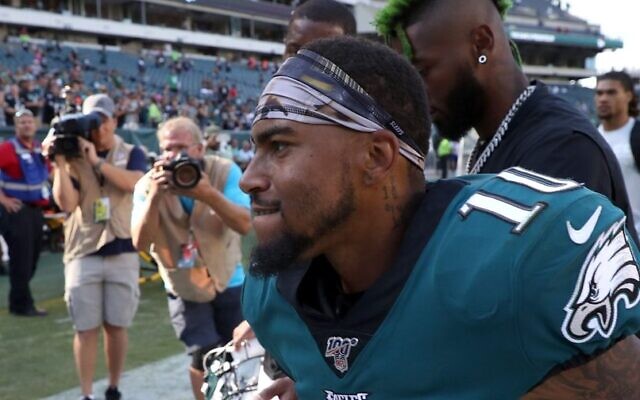Let’s turn foul play into a positive
'While for most Australian Jews, Jackson was just another high-profile celebrity who had posted antisemitic content, for me it felt more personal; like somewhat of a betrayal'.
LAST Wednesday morning, as news broke that Philadelphia Eagles star wide receiver DeSean Jackson had posted antisemitic material on Instagram, I received a text from Executive Council of Australian Jewry co-CEO Alex Ryvchin.
“I expect a statement from you by COB,” he said.
Of course, I’m normally the one asking for a statement. It also happens that many of our conversations, once business is discussed, move on to the all-important subject of American football. I’m a tragic Philadelphia Eagles fan and in the last decade or so I have followed the team closely.
DeSean Jackson was one of my favourite players during his first stint with the team from 2008 to 2013; the first Eagles merchandise I owned was his number 10 jersey.
Hence I was especially disappointed about his posts, made in the context of the Black Lives Matter movement, which included a quote misattributed to Hitler saying “because the white Jews know that the Negroes are the real Children of Israel and to keep America’s secret the Jews will blackmail America”; and praise of the antisemitic Nation of Islam leader Louis Farrakhan.
While for most Australian Jews, Jackson was just another high-profile celebrity who had posted antisemitic content, for me it felt more personal; like somewhat of a betrayal.
“When he catches a ball in open space, do I want him to score?” I wondered. “Can I still support the team if he is on it?”
I have come to the conclusion DeSean Jackson is not an antisemite. Though his apology was clumsy, I think it is sincere. There is much for him to learn but his stated openness to do so – demonstrated by his speaking with a Holocaust survivor and pledging to visit Auschwitz – is commendable.
But what this incident does demonstrate – especially given how other players responded – is that there is a long way to go before there is real widespread understanding of antisemitism and the Shoah among the very people who need to be the role models.
During an online panel last Sunday featuring current and former Jewish players, most said many of their teammates had either never met a Jewish person before or knew practically nothing about Judaism.
In light of the original posts, one player defended “the honorable farrakhan” while others downplayed the issue of antisemitism.
“I wish people commented this much on a BLM topic,” said fellow Eagle Marquise Goodwin, while former Eagle Malcolm Jenkins – known for being outspoken against racism and injustice – was disappointingly even more dismissive.
“All of this back and forth that’s going on right now is a distraction. Comments were made, and they were wrong,” he said. “Jewish people aren’t our problem, and we aren’t their problem. Let’s not lose focus on what the problem truly is, and that’s that black lives still don’t matter in this country.”
It comes as no surprise the two most high-profile Jewish players in the NFL weighed in, the Kansas City Chiefs’ Mitchell Schwartz saying, “The posts came from a place of ignorance,” and “We can only have change if we denounce racism in all forms.”
The New England Patriots’ Julian Edelman meanwhile offered to accompany Jackson on a tour of the Holocaust Museum in Washington, D.C. and in turn visit the National Museum of African American History and Culture. “I know he said some ugly things but I do see an opportunity to have a conversation,” he said.
But perhaps the most heartening response was this from the Pittsburgh Steelers’ Zach Banner, an African American: “There’s a common misbelief that among Black and Brown people – and I know this from growing up and I’ve heard it and I’ve listened to it – that Jewish people are just like any other white race … you don’t understand that they are a minority as well,” he said.
Citing the Tree of Life massacre in which 11 worshippers died, he continued, “We need to understand that Jewish people deal with the same amount of hate and similar hardships. When we talk about Black Lives Matter and talk about elevating ourselves, we can’t do that while stepping on the back of other people.”
As tensions in America continue to simmer in the wake of the George Floyd killing, let’s hope moderate, inclusive voices like Banner’s prevail and drown indifference or Farrakhan’s hatred.
Coincidentally, just days after the Jackson furore erupted, Jewish Eagles owner Jeffrey Lurie’s film production company announced it had completed a documentary about Hitler’s rise to power. Perhaps it might be a good idea if Lurie and general manager Howie Roseman, who is also Jewish, make viewing the film compulsory for players.
It would be a powerful way of demonstrating just how easily the spread of misinformation – whether deliberately as practised by the Nazis or inadvertently by an impressionable NFL player – can lead to tragic and devastating consequences.
Gareth Narunsky is deputy editor of The AJN.


comments